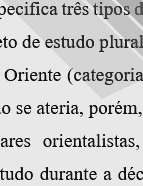

There were other voices too, those of ‘oriental’ orientalists who lived outside of Portugal but focused on the nation in their studies. Some worked in isolation, unable to break into the national orientalist community, perhaps because they did not publish their work in Portuguese, because their studies mostly circulated among other academic traditions, or, possibly most importantly, because they were critical of Portugal’s sixteenth- and seventeenth-century interventions in Asia, denouncing the country’s use of violence in its imposition of an exogenous religion. Gerson da Cunha, who was Goan-born but lived between Bombay and England, is, as shown by the studies of Filipa Lowndes Vicente (e.g., “Orientalismos periféricos?”, 2010), the most obvious example of this kind of figure, having always written in English and transited between British India and the orientalist milieux of Italy and England. As revealed by the research carried out as part of the ongoing project Texts and Contexts of Portuguese Orientalism at the University of Lisbon, there are a number of other more recent but equally marginal cases. Some can be compared to Gerson da Cunha, such as his successor George Mark Moraes, who was born on Salsette but settled in Bombay. Others, even those who published prolifically or lived in the metropole, were sidelined by the historical moment at which they were writing, being overshadowed by the dominance of contemporary historians who were more closely aligned with the developments of the prevailing political regime. Such is the case of José Maria Braga, who grew up in the Macau-Hong Kong region and consolidated his career as an independent researcher, with no formal link to the academy or to scientific institutions of the Portuguese metropole.
A natural child of Hong Kong, but an adoptive son and descendent of Macau, Braga emigrated to New York in the late 1960s, before settling in Australia (first Canberra, then Sydney) and finally returning to the United States (San Francisco). He produced a vast and eclectic oeuvre concerning the history of the Portuguese in Asia as well as missionary activities in the region. His work was, in fact, very much in the same vein as that undertaken by Cunha Rivara in the 1850s and 1880s, although the latter circumscribed himself to the Portuguese presence in India and concentrated his research on the archives of Goa. As pointed out by Isaú Santos (“José Maria Braga”, 2014), Braga carried out important archival work, mainly in Portugal (in the National Library of Ajuda, for example, where he inventoried the existing handwritten sources by the Portuguese Padroado of the Orient, particularly those concerning Macau, China and Japan) but also in Italy and Japan. Taking Macau as his principal case study, he worked alongside the likes of British historian Charles Boxer, Father Manuel Teixeira from Macau and Father António da Silva Rego, with whom he corresponded. Santos further highlights the fact that the works of Boxer and Braga complement each other in their “study of Luso-Chinese relations – since the start of Jesuit missionary activities in Asia – and also in their [...] knowledge of the position of the Macau/Hong Kong axis in the circuit of information and misinformation established during the Second World War” (Idem, p. 299). Indeed, given his geographical localization, Braga served as a privileged point of connection/mediation between Portugal and the Portuguese community in Hong Kong. On the occasion of the first Congress of Portuguese Communities in the World, for instance, which took place in Lisbon in December 1964, he was contacted by Silva Rego, acting on behalf of the Lisbon Geographical Society, who asked him whether he could recommend representatives of the Portuguese community in Hong Kong to participate in the event.
